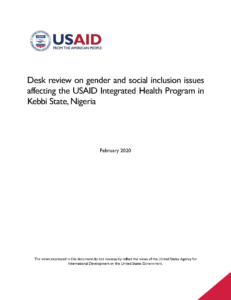Gender, Social Inclusion, and Health in Kebbi State
 Desk review on gender and social inclusion issues affecting the USAID Integrated Health Program in Kebbi State, Nigeria – USAID IHP Task Order 04
Desk review on gender and social inclusion issues affecting the USAID Integrated Health Program in Kebbi State, Nigeria – USAID IHP Task Order 04
Authors: Taroub Harb Faramand, Allison Annette Foster, Megan Ivankovich, Mitali Dahanukar, Morgan Mickle, Tisa Barrios Wilson, Kelly Dale, and Nafisa Zaki
Kebbi State is among Nigeria’s poorest performers in terms of health indices, especially in child mortality and maternal health, malaria, pneumonia, and diarrhea. Furthermore, gender is intricately linked to health access and reproductive, maternal, neonatal and child health, plus nutrition and malaria (RMNCH +NM) outcomes. This desk review addresses the underlying causes – including inequitable access to health information and services – and identifies gender and social inclusion issues, as well as state policies, which affect serve quality, health programming, and health systems strengthening outcomes. Recommendations focus on achieving more effective and efficient RMNCH +NM strategies, activities, and sustainable change.
Faramand, T.H., Foster, A.A., Ivankovich, M., Dahanukar, M., Mickle, M., Barrios Wilson, T., Dale, K., & Zaki, N. (2020). Desk review on gender and social inclusion issues affecting the USAID Integrated Health Program in Kebbi State, Nigeria. Palladium International, LLC and WI-HER, LLC.